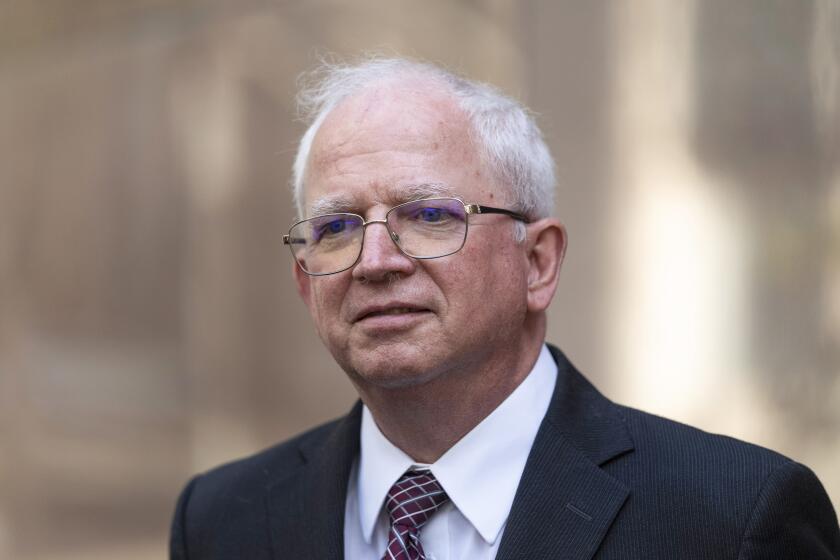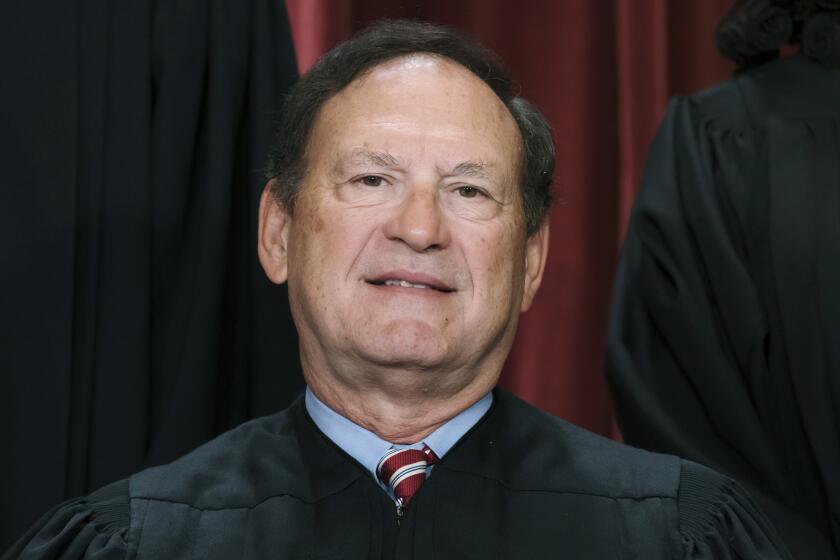2001 Speech to GOP Has Clark Defending Political Allegiance
Democratic presidential candidate Wesley Clark sought Friday to quell persistent questions about his party allegiance that stem from a speech he gave in 2001 at a Republican fund-raiser in his home state of Arkansas.
Clark has discounted the significance of his remarks and, since declaring his candidacy last week, has stressed his commitment to core Democratic positions. But at least one of Clark’s Democratic rivals and Republicans are spotlighting his appearance at the GOP dinner in Little Rock as evidence of what they called political opportunism by the retired Army general.
For Clark, who is seeking to build a political organization from scratch, lingering questions about his fealty to the Democratic Party could prove perilous. Although he has vaulted to the top of some national polls on the Democratic candidates, he could fare poorly in the early nominating contests if he cannot convince party activists and primary voters of his partisan credentials.
The Republican National Committee on Friday circulated a transcript and videotape of Clark’s May 11, 2001, speech before the Pulaski County Republican Party. Clark had gained attention as NATO supreme commander in the late 1990s, but his party affiliation was unknown at the time of his speech.
In his comments, Clark praised past GOP presidents and commended the personnel of the Bush administration and some of its policies. Republicans who heard Clark speak said he seemed to be one of them.
Of Ronald Reagan, Clark said: “He helped our country win the Cold War. He put it behind us in a way no one ever believed would be possible. He was truly a great American leader. And those of us in the armed services loved him, respected him and tremendously admired him for his great leadership.”
He also lauded President George H. W. Bush, father of the current president, for “tremendous leadership and statesmanship” in helping to realign Europe after the fall of the Berlin Wall and the breakup of the Soviet Union. And then he praised the second Bush administration.
“If you look around the world, there’s a lot of work to be done,” Clark said. “And I’m very glad we’ve got the great team in office ... [Secretary of State] Colin Powell, [Defense Secretary] Don Rumsfeld, [Vice President] Dick Cheney, [national security advisor] Condoleezza Rice ... our President George W. Bush. We need them there because we’ve got some tough challenges ahead in Europe.”
Clark said he was pleased that Bush was pursuing a free-trade policy for the Western Hemisphere, building on the North American Free Trade Agreement.
“I think the ultimate answer in South America is bring prosperity, bring American know-how down there,” he said.
Bush’s trade policies increasingly are a target of attack for several of the Democratic White House contenders, who express concern that lowering trade barriers with other countries is harmful to U.S. workers. As on many issues, Clark has yet to detail his views on trade. But he has called for a review of existing trade deals to ensure that foreign countries are providing fair access for American products.
Clark’s words of support for Bush in 2001 came as Democratic leaders were assailing several of the administration’s initial moves, including its push for sweeping tax cuts and its rollback of some environmental regulations. Many Democrats were also criticizing Bush for leading America away from various global commitments and toward a more unilateralist foreign policy.
Clark mentioned President Clinton in passing only once in the speech, and offered no praise of him.
Asked about the speech in a debate Thursday with his nine rivals for the Democratic nomination, Clark said he had reconsidered Bush in the last two years and that he felt at home in the Democratic Party. “I think it’s been an incredible journey for me and for this country since early 2001,” Clark said. “We elected a president we thought was a compassionate conservative. Instead, we got neither conservatism nor compassion.”
Sen. Joe Lieberman of Connecticut, the Democratic vice presidential candidate in 2000 who now is seeking the top slot on the 2004 ticket, said Friday that Clark’s explanation was not good enough.
“By May 2001, I didn’t have to be taught about George W. Bush,” Lieberman said. “In 2000, [Democratic presidential nominee] Al Gore and I warned America that George Bush would squander our surplus, wreck our economy, trash our environment.”
Lieberman added that it seemed Clark had made “a journey of political convenience, not conviction.”
Regarding Lieberman’s comments, Mark Fabiani, a Clark spokesman, said: “Sen. Lieberman is an increasingly desperate candidate, and it’s unfortunate he chose to attack another Democrat.”
A senior advisor to former Vermont Gov. Howard Dean, another of the Democratic candidates, said Friday the Little Rock speech was “a problem” for Clark. “This is a nominating process, and you have to break through somewhere,” the advisor said.
Referring to the first two crucial contests in the race, the advisor added: “This isn’t going to help in Iowa or New Hampshire.”
The Republican National Committee clearly was doing its part to try to undercut Clark’s standing among Democrats. Along with circulating the transcript and video of Clark’s Lincoln Day Dinner speech, the RNC issued a press release headlined: “Two Years Ago, This Democrat Sounded Like A Republican.”
That was the view of two of the state Republicans at the fund-raiser -- then-Sen. Tim Hutchinson and Gov. Mike Huckabee.
Hutchinson said Friday that Clark “got a rousing reception, interrupted many times with applause and a standing ovation at the end.... The assumption of everyone was that he was a Republican.”
The governor also said that at the time he thought: “Chances are, this guy’s one of us.”
“We appreciated him helping us raise money for Republican candidates -- including me,” Huckabee said.
In his speech, Clark praised the emergence of “a two-party system” in a state long dominated by Democrats.
*
Times staff writer Ronald Brownstein contributed to this report.
More to Read
Get the L.A. Times Politics newsletter
Deeply reported insights into legislation, politics and policy from Sacramento, Washington and beyond. In your inbox three times per week.
You may occasionally receive promotional content from the Los Angeles Times.






